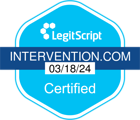As an addiction and mental health expert, I’ve witnessed firsthand the devastating impact that substance abuse and mental health issues can have on individuals and their families. For years, traditional interventions were the norm – confrontational and sometimes aggressive approaches aimed at “trapping someone to treat them” or lying to them to get them in to the room with those who love them. But as we learn more about the complex nature of addiction and mental health, a new approach is gathering steam. I know, since I practice it daily, and have used this new and improved intervention model in more than 1200 cases. Invitational Intervention is a better way to intervene, and allows for a the one in crisis (the “Identified Loved One” or ILO) to receive treatment instead of being so angry they can’t even think straight.
This intervention model, where the ILO is invited to their own intervention is based on the groundbreaking ARISE studies out of the University of Pennsylvania. The ARISE (A Relational Intervention Sequence for Engagement) model, developed by five researchers including Dr. Judith Landau & Dr. James Garrett, is a compassionate and inclusive approach that seeks to engage individuals struggling with addiction or mental health issues in a collaborative and supportive manner.
Unlike traditional interventions that often rely on confrontation and ultimatums, Invitational Intervention focuses on building trust, fostering healthy communication, and creating a supportive environment where individuals feel empowered to speak up, and seek help.
The causes and conditions of addiction and mental health issues are complex and multifaceted, often stemming from unresolved emotional pain, complex trauma, or other underlying issues. With this new way to intervene, we find the ways to break free from the blame, shame and guilt that has been our benchmarks for normal. We come to understand how “broken” or “bad” people, are instead just individuals who are hurting and in need of support.
One of the key principles of Invitational Intervention is the importance of empathy and compassion. Instead of using blame or shame, loved ones are encouraged to approach the ILO with love, understanding, and a non-judgmental attitude. The goal is to create a safe space where the individual feels heard and validated, which can help reduce resistance and defensiveness.
Another core concept is the emphasis on collaboration and inclusion. Your ILO is invited to participate in the process, and their input and feedback are valued. It’s not about “ganging up” on the individual, but rather working together as a team to create a plan for recovery that is tailored to the individual’s needs and preferences.
This collaborative approach empowers the individual to become a stakeholder in their own recovery alongside those who care for them.
One thing I know for sure, having managed so many of these life-changing interventions is that the invitational approach has a higher success rate compared to traditional interventions. In fact, research has shown that individuals who go through Invitational Intervention are more likely to enter and stay in treatment, and have better long-term outcomes compared to those who experience confrontational interventions.
With this style of intervention, which I call Breakfree Intervention, we use only as much pressure as needed, and seek to “talk with the ILO instead of just about them” in non-confrontational and inclusive ways. This reduces resistance and increases motivation for change.
Also key — the importance of ongoing support and follow-up. It’s not a one-time event, but rather a process that involves ongoing engagement and support. Loved ones are encouraged to continue to provide support and encouragement to the individual, even after they enter treatment. To this goal, I created Family Class to accomplish this, as it helps reinforce positive changes and promote the group’s understanding of recovery norms and challenges.
It’s a leap of faith to open your mind to actually inviting your loved one to their own intervention, yet this is the way. This IS the way. The way we demystify and declutter the day in the life of a family that so many dread. I love the work I do with families in helping their loved ones begin to have “more good — less bad” in their lives.
This Breakfree Intervention is a powerful and effective approach that has a legacy of transforming lives and reconnecting families for good.

